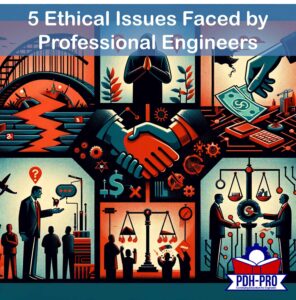Ethical Issues Facing Engineers Today
Professional engineers energize the economy. Between 2019 and 2029, the engineering sector will add nearly 75,000 new jobs.
Ethics energize engineering. Some engineers encounter ethical issues on a daily basis, including in interpersonal relationships. They can be difficult to navigate.
How do ethics and engineering relate to each other? What are ethical issues related to sexual and racial harassment? What are some ways to address ethical dilemmas?
Answer these questions and you can pursue an ethical career path in engineering. Here are five ethical issues that engineers face.
1. The Right to Privacy
There are several situations in which engineers have ethical issues with the right to privacy. Many engineers work in the medical sector. Access to patient information is strictly regulated, with patient-doctor confidentiality treated as sacrosanct.
But an engineer may need this information for some reason. Understanding how patients experience cancer pain can help them build products. Yet pain can be a very personal point of information to disclose, especially to a stranger.
Many engineers sign non-disclosure agreements when working for companies. Their clients may ask them for information that their agreements cover.
If they disclose this information, they will violate their agreement and risk their company’s right to privacy. But if they withhold their information, they risk losing their client. The client may also build a defective product because they don’t have full information.
A lot of companies store sensitive information on computers. The computers can get hacked and the information can get leaked. It may be difficult to contact the people who had their information stolen, especially if they were not aware that the company had their information.
2. Sexual Harassment
20 to 50% of women in engineering colleges experience sexual harassment. This harassment can continue as women enter the workforce.
Sexual harassment presents a number of difficult issues. It can be hard for someone to report their harassment because they are worried about their job. Many women have been fired or reassigned after talking about their experiences.
Most companies have internal mechanisms to deal with harassment. This can make it difficult to examine company policies and culture that lead to harassment.
It’s also hard to investigate harassment in the first place. Some instances involve witnesses, while others are “he said, she said” scenarios. Companies must make a determination based on limited evidence.
An engineering company can hire a third party to examine harassment. But this raises the possibility of an information leak. A woman’s personal and intimate experience with harassment may become public knowledge by accident.
Some men experience sexual harassment. Their stories may go unacknowledged because of gender bias or the power of their bosses.
Companies should institute company-wide policies on harassment, relating to the experiences of men and women. Yet they should be careful.
Talking excessively about harassment can upset people who have experienced it. The companies also risk focusing on the problem and not the solution.
3. Racial Discrimination
Engineering is a predominantly white space. In a 2019 survey, engineering students of color said that they were subjected to microaggressions and racist behavior.
Racial discrimination may be overt, but it may comprise more subtle behaviors. A white person may interrupt a person of color. They may challenge their ideas for no apparent reason.
It can be difficult getting to the bottom of racial discrimination situations. As with sexual harassment, a company may not be equipped to examine its own culture.
When racist behavior is determined, a company needs to decide a correct course of action. They must determine whether to punish the racist employee, including by firing them.
They then must decide how to prevent similar behavior in the future. But they need to be careful. Company-wide seminars on race can have the effect of marginalizing BIPOC and focusing on their suffering instead of their success.
Many engineering companies defend their employees’ right to freedom of speech. Yet they must balance that right with the welfare of BIPOC.
4. Professional Hierarchies
Engineering is a hierarchical profession. That makes it difficult for junior employees to challenge their bosses.
A young employee may notice that their boss made a mistake on something. They should speak up and correct the error. But they may be concerned that their job will be threatened if they do.
When they do speak up, their boss may not listen to them. They may refuse to continue the conversation, even though the employee should say something.
On rare occasions, a superior employee may steal the work of a junior one. It may be difficult to determine whether or not theft occurred.
The superior employee may have been a supervisor to the younger one. The younger one may have given some sort of permission to the older one to use their work. Engineering groups must examine hierarchies closely when looking at copyright.
5. Environmental Justice
Engineers are involved in a number of projects that impact the environment. Designing oil wells is an important one.
Oil wells provide fuel to help transport vehicles and keep people warm. Yet they can damage land and water resources. Burning oil contributes to climate change that can cause natural disasters.
Pipelines are useful tools for transporting oil. But they can damage the ground and water, and disrupt animal habitats. Many pipelines run through indigenous communities, affecting their rights to live and tend to the land.
Know What Professional Engineers Face
Professional engineers confront a number of issues. They may need access to sensitive information. Yet access can violate patients’ right to privacy.
They may encounter sexual or racial harassment. They should report it, but a company may not be able to investigate it. Company-wide policies must affirm disadvantaged people instead of marginalize them.
Professional hierarchies may stymy a junior employee’s attempt to correct an error. Many engineers must balance economic benefits with environmental ones.
The best way to resolve these problems is to get educated. PDH-Pro provides professional engineer continuing education resources. Browse our classes today.
